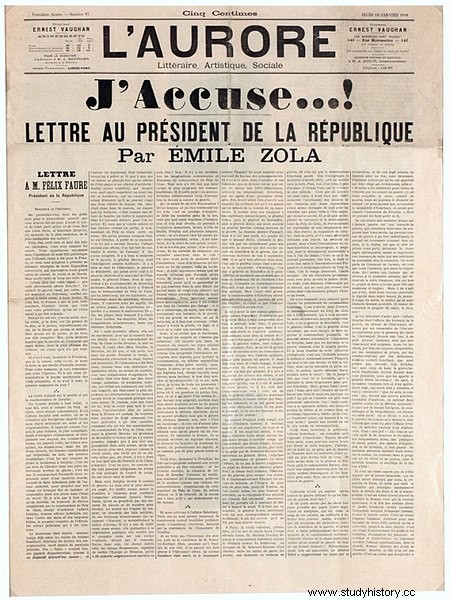- In 1894, Alfred Dreyfus, a French staff officer of Alsatian and Jewish origin, was accused of having provided information on French military secrets to Germany. Found guilty, he was sentenced to prison. His family organizes his defense and the real traitor is identified:Commander Walsin Esterhazy. This fact is recognized by Lieutenant-Colonel Georges Picquart, head of the military intelligence service. The broadening of support for Dreyfus forced the army staff to try Commander Esterhazy in a court martial. He is acquitted and Dreyfus remains imprisoned. After a vast press campaign, France is divided into two clans. The Dreyfusards defend the officer. Anti-Dreyfusards consider him the ideal culprit because of his origins.
- Émile Zola, revolted by the injustice suffered by Dreyfus, publishes three articles on the affair in Le Figaro , in 1897. Following pressure from some of the readers who did not appreciate Zola's commitment, he could no longer be published in this journal.
January 13, 1898

Characters
Alfred Dreyfus
Walsin Esterhazy
Georges Picquart
Ernest Vaughan
Emile Zola
Procedure
Since he became aware of the Dreyfus Affair, Émile Zola has been preparing a full article on this subject for several months. Finding no newspaper to publish it, he approached Georges Clémenceau, journalist for L'Aurore , a young militant newspaper. He offers them his article entitled:“Letter to Mr. Félix Faure, President of the Republic”. The title being too long and wanting to attract a wide readership, the boss of L’Aurore , Ernest Vaughan, wants to change it.
Clémenceau chooses the title “J’accuse…”. The article appeared on January 13, 1898 on the front page of the daily. The pamphlet is aggressive:Zola lists the actors and those responsible for the injustice suffered by Dreyfus. It meets with some success because it is the first to summarize the events of the case since its inception.
Émile Zola, aware of the risks to which he exposes himself, is prosecuted for public defamation, as provided for by the press law of 1881. He is found guilty and is sentenced to a fine and imprisonment. He went into exile in London pending the review of the trial of Alfred Dreyfus.
Consequences
- With the publication of the article, the debate on the Dreyfus Affair is revived. He reinvigorated the Dreyfusard camp, weakened by the acquittal of Major Esterhazy. Intellectuals, writers and scientists are mobilizing for the first time on social issues through petitions. The press has shown how it can do and influence public opinion.
- A second trial of Alfred Dreyfus is organized, he is found guilty, but pardoned for health reasons. In 1906, he was exonerated. For Zola, this position made him a target for the anti-Dreyfusards, his property was seized by the courts and he was unable to join the French Academy.
